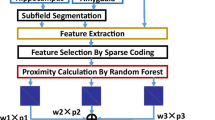Abstract
Subjective cognitive decline (SCD) is an early stage of mild cognitive impairment (MCI) and may represent the first symptom manifestation of Alzheimer’s disease (AD). Early diagnosis of MCI is important because early identification and intervention can delay or even reverse the progression of this disease. This paper proposes an automatic diagnostic framework for SCD and MCI. Specifically, we design a new multi-task learning model to integrate neuroimaging functional and structural connectivity in a predictive framework. We construct a functional brain network by sparse low-rank brain network estimation methods, and a structural brain network is constructed using fiber bundle tracking. Subsequently, we use multi-task learning methods to select features for integrated functional and structural connections, the importance of each task and the balance between both modalities are automatically learned. By integrating both functional and structural information, the most discriminative features of the disease are obtained for diagnosis. The experiments on the dataset show that our proposed method achieves good performance and is superior to the traditional algorithms. In addition, the proposed method can identify the most discriminative brain regions and connections. These results follow current clinical findings and add new findings for disease detection and future medical analysis.
Access this chapter
Tax calculation will be finalised at checkout
Purchases are for personal use only
Similar content being viewed by others
References
Jessen, F., et al.: AD dementia risk in late MCI, in early MCI, and in subjective memory impairment. Alzheimers Dement 10, 76–83 (2014)
Morris, J.C., et al.: Mild cognitive impairment represents early-stage Alzheimer disease. Arch. Neurol.-Chicago 58, 397–405 (2001)
Guo, H., Zhang, F., Chen, J., Xu, Y., Xiang, J.: Machine learning classification combining multiple features of a hyper-network of fMRI data in Alzheimer’s disease. Front. Neurosci. 11, 1–22 (2017)
Qian, L., Zheng, L., Shang, Y., Zhang, Y., Zhang, Y.: Alzheimer’s disease Neuroimaging Initiative: Intrinsic frequency specific brain networks for identification of MCI individuals using resting-state fMRI. Neurosci. Lett. 664, 7–14 (2018)
Tong, T., Gray, K., Gao, Q., Chen, L., Rueckert, D.: Multi-modal classification of Alzheimer’s disease using nonlinear graph fusion. Pattern Recogn. 63, 171–181 (2017)
Cui, Z., Zhong, S., Xu, P., Gong, G., He, Y.: PANDA: a pipeline toolbox for analyzing brain diffusion images. Front. Hum. Neurosci. 7, 42 (2013)
Craddock, R.C., James, G.A., Holtzheimer III, P.E., Hu, X.P., Mayberg, H.S.: A whole brain fMRI atlas generated via spatially constrained spectral clustering. Hum. Brain Mapp. 33, 1914–1928 (2012)
Ashburner, J., et al.: SPM12 Manual. Wellcome Trust Centre for Neuroimaging, London (2014)
Yan, C., Zang, Y.: DPARSF: a MATLAB toolbox for “pipeline” data analysis of resting-state fMRI. Front. Syst. Neurosci. 4, 13 (2010)
Qiao, L., Zhang, H., Kim, M., Teng, S., Zhang, L., Shen, D.: Estimating functional brain networks by incorporating a modularity prior. NeuroImage 141, 399–407 (2016)
Argyriou, A., Evgeniou, T., Pontil, M.: Multi-task feature learning. In: Advances in Neural Information Processing Systems, pp. 41–48 (2007)
Liu, J., Ji, S., Ye, J.: Multi-task feature learning via efficient l 2, 1-norm minimization. In: Proceedings of the Twenty-Fifth Conference on Uncertainty in Artificial Intelligence, pp. 339–348. AUAI Press (2012)
Zhu, X., Suk, H.-I., Wang, L., Lee, S.-W., Shen, D., Alzheimer’s disease Neuroimaging Initiative: A novel relational regularization feature selection method for joint regression and classification in AD diagnosis. Med. Image Anal. 38, 205–214 (2017)
Peng, H., Fan, Y.: Direct sparsity optimization based feature selection for multi-class classification. In: IJCAI, pp. 1918–1924 (2016)
Vorlíčková, J.: Least absolute shrinkage and selection operator method (2017)
Jacob, L., Vert, J.-p., Bach, F.R.: Clustered multi-task learning: a convex formulation. In: Advances in Neural Information Processing Systems, pp. 745–752 (2012)
Chen, J., Liu, J., Ye, J.: Learning incoherent sparse and low-rank patterns from multiple tasks. ACM Trans. Knowl. Discov. Data 5, 1–31 (2012)
Acknowledgments
This work was supported partly by National Natural Science Foundation of China (Nos. 61871274, U1909209, 61801305 and 81571758), Key Laboratory of Medical Image Processing of Guangdong Province (No. K217300003). Guangdong Pearl River Talents Plan (2016ZT06S220), Guangdong Basic and Applied Basic Research Foundation (No. 2019A1515111205), Shenzhen Peacock Plan (Nos. KQTD2016053112051497 and KQTD2015033016104926), and Shenzhen Key Basic Research Project (Nos. GJHZ20190822095414576, JCYJ20180507184647636, JCYJ20190808155618806, JCYJ20170818094109846, JCYJ20190808155618806, and JCYJ20190808145011259).
Author information
Authors and Affiliations
Corresponding author
Editor information
Editors and Affiliations
Rights and permissions
Copyright information
© 2020 Springer Nature Switzerland AG
About this paper
Cite this paper
Cheng, N. et al. (2020). Self-weighted Multi-task Learning for Subjective Cognitive Decline Diagnosis. In: Martel, A.L., et al. Medical Image Computing and Computer Assisted Intervention – MICCAI 2020. MICCAI 2020. Lecture Notes in Computer Science(), vol 12267. Springer, Cham. https://doi.org/10.1007/978-3-030-59728-3_11
Download citation
DOI: https://doi.org/10.1007/978-3-030-59728-3_11
Published:
Publisher Name: Springer, Cham
Print ISBN: 978-3-030-59727-6
Online ISBN: 978-3-030-59728-3
eBook Packages: Computer ScienceComputer Science (R0)





